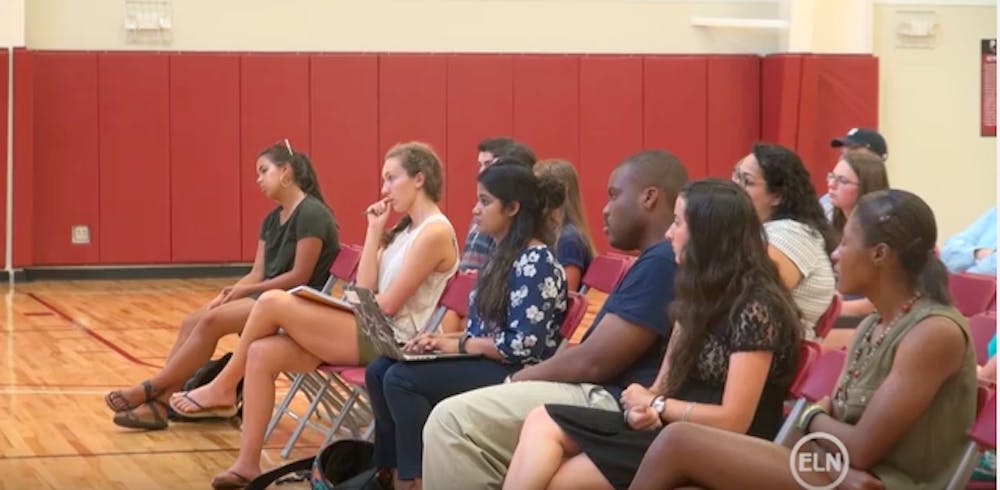In front of an audience of around 20 students, faculty and staff, Ray Lin, assistant director of the Center for Race, Ethnicity & Diversity Education (CREDE), sighed into his microphone.
Reflecting on the shootings of black men by law enforcement officers over the summer of 2016 — including Alton Sterling, a 37-year-old black man shot and killed during a confrontation with two police officers in Baton Rouge, Louisiana — Lin urged the audience to take a look at the bigger picture.
“These events are nothing new. They are symptoms of much larger, systemic problems,” he said. “We are going to have a summer like this one all over again if we don’t start looking at the issue as an assault by all of our institutions and not just as assaults by police.”
He was among fellow panelists Matthew Antonio Bosch, director of the Gender and LGBTQIA Center; Jessica Carew, assistant professor of political science; Jason Husser, assistant professor of political science and policy studies; and Rena Zito, assistant professor of sociology, at an informal discussion titled "Discussing a Tumultuous Summer" on Wednesday, Aug. 31.
The panel, co-sponsored by The Danieley Center Neighborhood and the Council on Civic Engagement, dissected topics ranging from police violence and the attack on the Pulse nightclub in Orlando, Florida, to Ryan Lochte.
Associate Professor of Communications Naeemah Clark moderated the event, encouraging the audience to participate in the conversation at this event and beyond.
“We’re reflecting on a historic summer,” she said. “Where do we even start?”
While the panelists — each bringing their unique perspective to the conversation — viewed the variety of events as products and reflections of various institutions or systemic issues, they agreed that genuine conversations and opportunities for further reflection are integral in remaining informed as the society moves forward.
Carew added that part of what makes it difficult for many people — including politicians — to have these genuine conversations is that sometimes it can go against what is fundamentally believed to be “American.”
“When we deny events because they don’t align with what we believe is fundamentally ‘American,’” she said, discussing the shootings of unarmed black men, “We start talking about different things — we bring up issues like ‘Blue Lives Matter’ and we deny ‘Black Lives Matter.'”
But genuine discussions, they added, can sometimes be hindered by the advent of social media.
Citing the series of racist tweets directed at Leslie Jones, who plays a leading role in the 2016 release of "Ghostbusters," and the public scrutinization of gymnast Gabby Douglas, who was criticized for not putting her hand over her heart when the national anthem played during the 2016 Summer Olympics, Clark questioned why such events often happen to celebrities, especially those who identify as women of color.
Zito pointed to how the democratization of social media has allowed further access to the tool of anonymity.
“When people are anonymous, it can become a game of ‘Who can get the most response?’ from the public,” she said. “A lot of things that are shared are therefore often extreme and radical.”
To Husser, this trend of holding and sharing extremely polarized, radical ideas — be it in online or offline contexts — is a result of an increasingly polarized congress.
“Congress polarized and then Americans polarized,” he said. “There are no moderates in Congress anymore, because the No. 1 way to lose your seat is to become a moderate.”
To Lin, the resolution begins with confronting realities.
“The millennial generation is arguably one of the most confused generations because they’ve grown up in what they’re constantly told is a post-racial society,” he said. “There’s a value in being real. Our disparities are worse than they ever were, and it’s important that we view them in a way that is real.”
Freshman Rick Everage, who attended the event in hopes to hear different perspectives over the events that occurred this summer, said he got exactly what he wanted from the conversation.
“A wide range of opinions were presented here,” he said. “And that was exactly what I was looking for — I was trying to get opinions and thoughts I had not previously considered.”
But he wished the seats around him were more filled.
“A lot of people can think and say crazy things these days because they don’t have the knowledge and understanding of these events and how complex they really are,” he said. “That’s why they need to attend events like this one so we can finally start to have these real discussions.”


